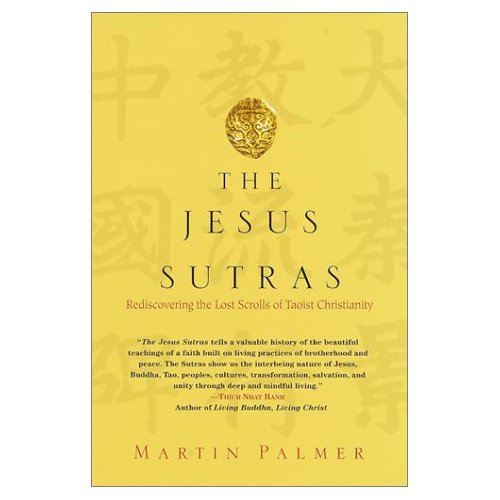Hi Yall
Isnt zen buddhism and Christianity kinda the same ? If not whats the difference from zen buddhism and christianity? And cant some one be a zen buddhist christian? Y or y not
There are a lot of people who happen to be involved in Buddhist practices and claiming Christ - and they are able to do so because they know how to keep the Lord central while also seeing ways that the culture they grew up in can be compatible with that...similar to Paul in Acts 17 when it came to Athens/Mars Hill and him using things central in the culture as bridges for explaining the Lord and noting how He'd seek to become all people - however far possible he could go and yet still remain in Christ - so that others would come to the Lord (
1 Corinthians 9:18,
1 Corinthians 9:20 and
1 Corinthians 9:22).
There are others I've come across that deal with similar issues. Brother Philip Jenkins, in his book "The Lost History of Christianity" noted often the way that believers went into Asian lands and contexualized the Gospel within Tao and Buddist terms that the locals could readily understand (discussed
here,
here, and
here at
The Lost History of Christianity: The Thousand-Year Golden Age of the Church in the Middle East, Africa, and Asia--And How It Died - Page 14 ). The Nestorians were well known for this - and many are not aware of how the Nestorians/other Eastern Christians impacted where so many didn't - going as far as India, Mongolia, and China as well as Japan.. ...more shared more in-depth elsewhere as well (#
5 #
10, #
26 , #
63 , #
126 )
Others, such as St.Francis Xavier and others had the same mindset...for there are many other things that were revelations from the Lord. Partial truth, if one wishes to call it such, that was given as a foreshadow of what was to come later...or what had already come (as Islam came after the Church began) and yet had not yet been fully understood by the people that hadn't encountered it yet. If aware of something known as
Ancient Faith Radio, they did a series on the issue of how in some cultures, it seems that they were already being prepared for the presentation of the Gospel…with it being established that GOD was at work in all cultures far before any others with revelation of what the Hebrews had came around. The radio brodcast from "Ancient Faith Radio" was on a book entitled “Christ the Eternal Tao”…and for more info, one can go online/look up
"Christ the Eternal Tao - Ancient Faith Radio". I thought it was interesting to see from an Eastern Christian perspective how the Tao Te Ching is presented as an imperfect, incomplete foreshadowing of what would later be revealed by Christ.
Indeed, it's amazing how the Gospel was contexualized in other cultures of Asia such as in Chineese culture. There was a book I was able to come across a couple years ago about the first Christian missionaries to China (in the 6th century, I think) - for they w
ere Nestorian Christians from the Middle East. It was really cool to see how they "contextualized" the gospel into terms and images that resonated with the local Taoist, Buddhist, and Confucian cultures. ..
A book I was informed of awhile ago is entitled
"The Jesus Sutras" by Martin Palmer.....of which there is an entire series on the subject entitled
The Jesus Sutras (Part 10): ‘He is the scaling ladder' - The Jesus Question /
The Jesus Sutras (Part 1): Introduction - the Jesus Question
It is an historical account of the first Christian mission to China (led by the monk Alouben) in 635, a piecing together of various strands of evidence: a long-lost Christian monastery now used as a Buddhist temple (with Christian statues in the eighth-century pagoda), a sutra (holy writing) of stone in a stone library, and “The Jesus Sutras,” a collection of scrolls found hidden in a secret library that was sealed around 1005.
From these fragments, the author pieces together a framework for what these early Christians believed, how they acted and interacted with the myriad of cultures and religions around them. The result is a fascinating depiction of a Christianity that is adaptive, hospitable, and relevant.
These early Chinese Christians drew upon imagery from their understanding of the Taoism, Confucianism, Buddhism, Jainism and Shamanism of Tang Dynasty China, which allowed them to present a radical image of Christ as the Dharma King, sending “your raft of salvation to save us from the burning streams” - even saving us from karma and reincarnation.
Here's one of the sutras:
Beyond knowing, beyond words
You are the truth, steadfast for all time.
Compassionate Father, Radiant Son,
Pure Wind King - three in one…
Supreme King, Will of Ages,
Compassionate Joyous Lamb
Loving all who suffer
Fearless as You strive for us
Free us of the karma of our lives,
Bring us back to our original nature
Delivered from all danger.
Sutra of Praise to the Three Powers, A.D. ca. 780-790
Another book I think is worth reading on the subject is known as
"Faith of Our Fathers: God in Ancient China" by
Dr. G. Wright Doyle - more discussed in
The One True God In Ancient China - Journey To Orthodoxy. It's truly amazing considering what many other Chinese have noted when it came to the differing religions of their cultures - and how MONOTHEISM was already present in the ancient history of China....with the other religions that developed later losing sight of the roots that were always present - and those new religions all having aspects of early truth that as lost
God in Ancient China

There've been other threads dedicated to more in-depth discussion on the ways the Gospel was contexualized within the cultures of others. One
thread that comes immediately to mind is
Cochin & Hindu Hebrews: Are most Messianic Jews familar with Indian Jewish Believers? , on what life was like for believers in the Hindu world...including Jewish believers as well and the ways they found ways to spread the Gospel

The work of E.Stanley Jones always comes to mind, seeing how he worked with others in the Hindu world as a Methodist minister and radically shaped the ways others saw evangelism. The man was a big inspiration for others like Dr.Martin Luther King in the work he did---and to see how many came to Christ because of his heart for the Kingdom of God always encourages me (more shared
here,
here,
here,
here,
here,
here,
here,
here,
here ,
here,
here and
here).
St.Francis Xavier did similar when it came to his work amongst others in Japan, which has always amazed me in so many ways...just
as the Nestorians did as well in their own context with working with the Mongols as well as Japan even before Xavier arrived (
more here ).





